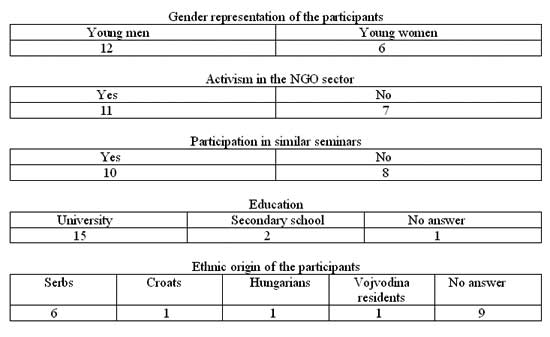FROM ETHNIC JOKES TO HATE
SPEECH
Novi Sad, June 28-30, 2007
The first in the series of four 3-day confidence-building
workshops/seminars planned under the project "Fostering Vojvodina's Multiethnic
Identity" was organized in Novi Sad on June 28-30, 2007.
"I've been telling and retelling thousands of hard-core ethnic
jokes but it never occurred to me that by doing that I am practically spreading negative
stereotypes about others, let alone partaking in the production of what is identified here
as hate speech," said a participant in the seminar at the end of the first workday.
Over three days of the seminar, young people - secondary school and
university students from Odzaci, Backa Palanka, Zrenjanin, Sid, Ruma and Novi Sad - had
"the most welcome opportunity," as they put it, to discuss with the lecturers
engaged by the Helsinki Committee ethnic prejudice and stereotypes from a rather unusual
angle - the angle of ethnic jokes and their role in the incitement and justification of
violence, as well as the topics such as conflict transformation, tolerance, factors of and
measures for confidence-building crucial for the life in multiethnic communities.
The participants in the seminar were truly captured by the addresses of
publicist Rajko Djuric, psychologist Tamara Tomasevic and publicist Mirko Djordjevic. By
earmarking the scope of the prejudice about members of the Roma community, Mr. Djuric
vividly laid bare the racist character and mobilizing potential such prejudice
effectuated. Ms. Tomasevic's address focusing the significance of mutual trust and
reconciliation motivated the participants to suggest that the seminar to come should be
exclusively dedicated to this problematic. A similar request was put forth after the
lecture delivered by Mr. Djordjevic, who elaborated the relationship between religion and
politics. Namely, the participants suggested that a seminar should be supplemented by a
course of training in comparative approach to religions with Mirko Djordjevic (whose
address was graded by A+) as a key lecturer. Other lecturers were also highly graded by
the participants. The latter were impressed by Mr. Djuric's erudition and lecturing, and
with Ms. Tomasevic's forwardness and open-mindedness. Organizers' efforts also got an
enviable grade. According to the participants, topics were to the point, and lecturers had
not only managed to provoke their active participation but also to enrich their overall
knowledge. "This is one of the best groups of young people I've ever lectured
to," commented Mirko Djordjevic.
As for criticism, the participants took the seminar should have lasted
longer - "three days is not enough to cover all those interesting topics," said
the great majority.
Since the seminar coincided with the 13th International Festival of
Alternative and New Theater "Infant" in Novi Sad, the participants had the
opportunity to watch one of the plays - "The Quarter" performed by a troupe from
New Zealand. It was the Novi Sad Cultural Center that made their visit to the Festival
possible. The participants also attended the opening of the 4th International Wine
Festival.
The number of young people who had applied for the seminar exceeded the
one envisaged by the project. The list of finalist was concluded on June 20, 2007.
However, two days before the startup of the course two young people asked the organizers
to be excused for justified reasons - they had to take their exams at the time.
The organizers duly informed both print and broadcast media about the
seminar's schedule and agenda. The Romany desk of the TV Vojvodina displayed particular
interest in the seminar and asked the project coordinator to guest one of its shows so as
to speak about the Helsinki Committee's work and the ongoing project.
The participants were asked to evaluate the seminar on its last day. As
referred to in the paragraphs above, they underlined the selection of topics and the
lecturers' attractive and thought-provoking presentations. They also said they had had the
opportunity to learn something they would not have otherwise. "What we learned here
will be most useful for the work of our local organizations. Besides, we would gladly
welcome the same lecturers in our communities," stated a participant. All those
compliments are the more so significant since they come from the participants (over 50
percent of the total number) who have already attended similar courses of training. All
participants without exception underlined the necessity to have such seminars organized in
the period to come.
The confidence-building seminars are realized with the assistance of the
European Union under the EuropeAid program.

|
